
Digital transformation is a term with many meanings, and people often interpret it in their own way. Here, by digital transformation, we mean the automation of operations and the integration of digital technologies and services that significantly change the way companies operate and interact with their customers.
Automation of operations is an essential factor for the success of small businesses as it creates an advantage through an efficient and accurate (error-free) operation of staff members, thus granting them more time for strategic tasks. Many companies understand it and seek to automate their business processes by implementing an off-the-shelf core information system or developing their own.
Also, with the increasing number of digital technologies and services that support sales, deliveries, payments, and other functions required by businesses, the ability to integrate them becomes very important. Technologies and services can give advantages, at that some of them have become a must-have condition to stay on par with competitors. For this reason, many companies strive to deploy all of the above as soon as possible. The starting point here is to ensure the company's core system supports plenty of integration options.
Due to a tight budget, small businesses often start process automation by acquiring off-the-shelf software. Still, the customization and integration options for such a solution tend to be limited. And even if a company finds a ready-to-use product that fully meets current requirements, at a later stage, when it faces a need to modify internal processes, it might turn out that the system is not flexible enough. But it is not the case when it comes to automation on the 1C:Enterprise platform.
Among the key advantages of business automation with the 1C:Enterprise platform is that companies can tailor their core information systems to their business processes. At that, there is no need to develop your own costly system from scratch. 1C:Enterpise off-the-shelf solutions for resource planning, inventory management, and accounting come with open source code. So, it is easy to customize them and integrate almost any external service and technology. And it does not take much time due to the low-code platform capabilities.
Here is how the 1C:Enterprise platform has helped Herbliz, which has a small manufacturing facility and retail and wholesale units, go through the digital transformation.
Herbliz, based in Germany, manufactures and sells herb oil beauty products. The company employs about 30 workers. Some are in manufacturing, and others promote products and handle sales. The company offers its products to wholesale and retail customers. Initially, all retail sales were going through offline shops, but in 2021 everything went online.
The core of the Herbliz information system is 1C:Drive, the 1C:Enterprise platform-based ERP solution for small businesses. The company uses 1C:Drive to manage inventory and finances, set prices and discounts, and create management reports. Previously, 1C:Drive was also used for cash registers in offline shops.
Relying on the rapid development tools of the 1C:Enterprise platform, the Herbliz developer adapted the off-the-shelf 1C:Drive solution to the company-specific business processes and integrated necessary services and equipment. Here is a brief description of the system.
It runs in a private cloud on a rented dedicated server. Herbliz manages the server, but maintenance comes from the server owner. The company believes this approach is more efficient in the price-quality-reliability paradigm when compared to the on-prem option. There are 5 users in the system. Thanks to cloud deployment, they can access the solution using various means, including web browsers.
Online Sales
The company sells its products via its website and four marketplaces. Aiming for the most efficient logistics, the company cooperates with a fulfillment agent responsible for processing, storing, and delivering orders to customers. For convenient interaction with the fulfillment agent and the marketplaces, the Herbliz developer created several integrations. Thanks to the well-documented API for each marketplace and rich functionality for the HTTP(S) protocol offered by the 1C:Enterprise platform, the development of each integration took just one person-month.
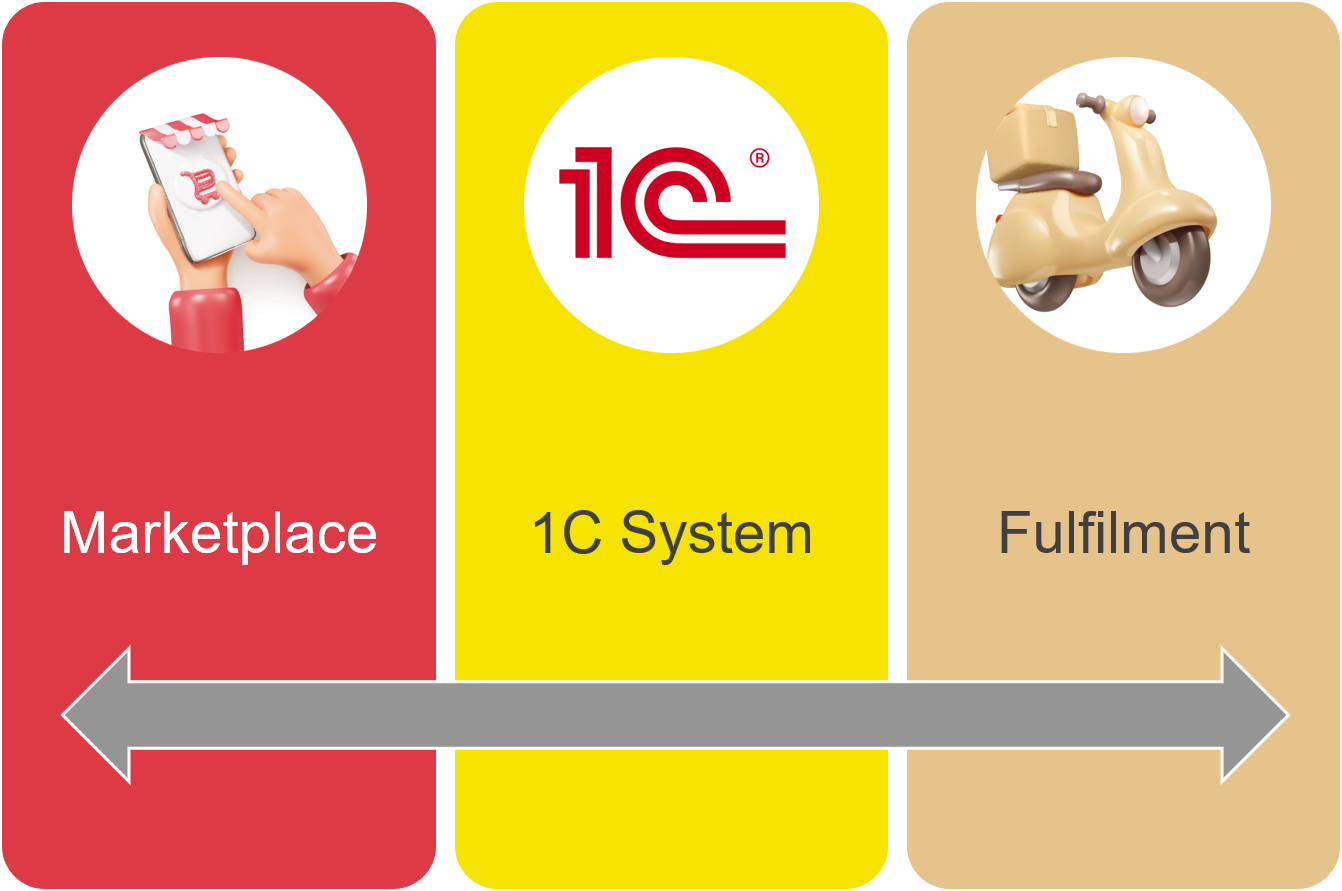
The resulting online sales process at Herbliz looks as follows. The 1C system uploads to the marketplaces product categories, the number of products by categories, prices, and discounts, plus all other product attributes required by the marketplaces, including dimensions, weight, age limitations, and similar. Also, the system retrieves data on placed orders from the marketplaces. Upon receiving an order, the 1C system creates an internal order, then shares the respective data with the fulfillment agent that delivers the order to a customer. On shipment of the order, the fulfillment agent passes to the 1C system the order tracking number. The 1C system passes the order status and the tracking number received from the fulfillment agent back to the marketplace to let the customer track the order where it was initially posted. All of the above happens automatically. Below you can see some screenshots referring to customer orders.
An order placed on a marketplace:
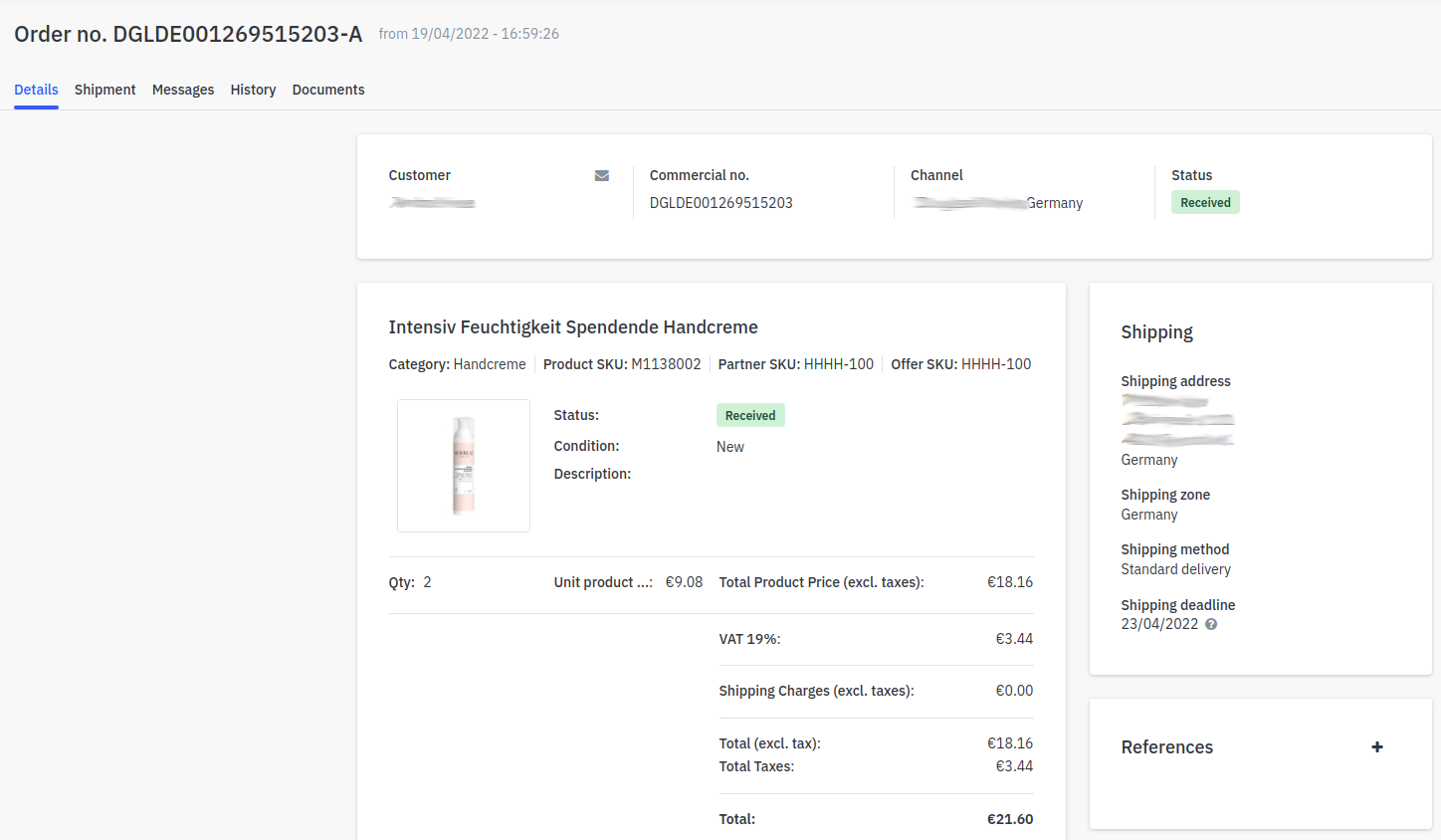
The exact order downloaded into the 1C system:
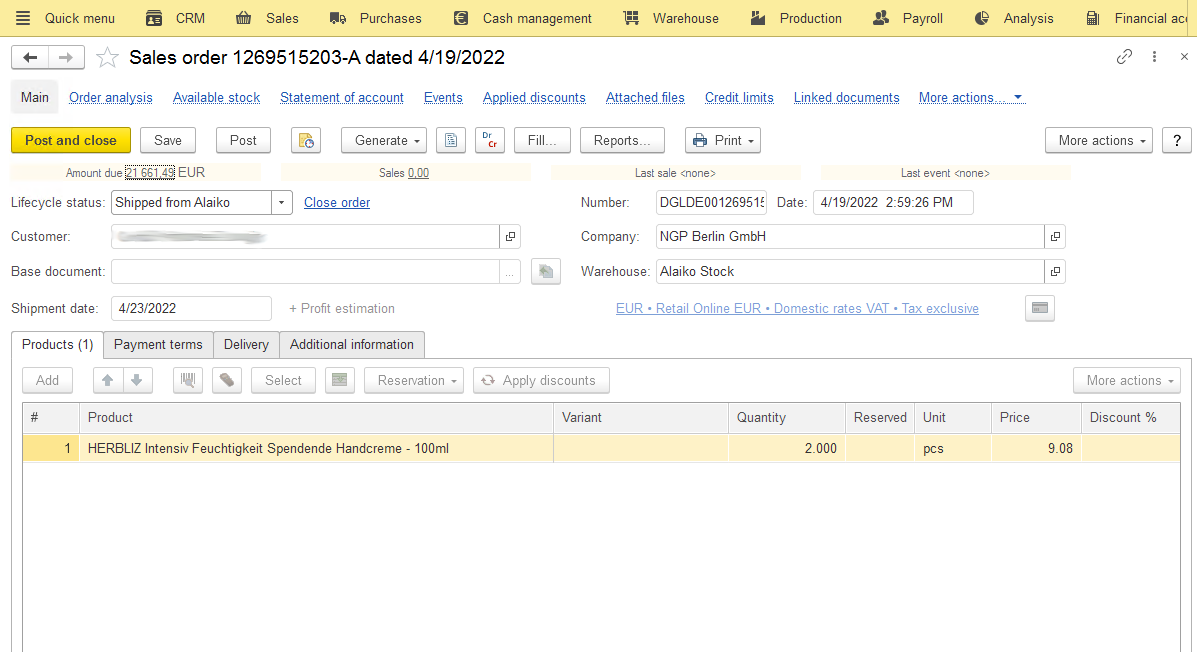
The exact order in the fulfillment agent system:
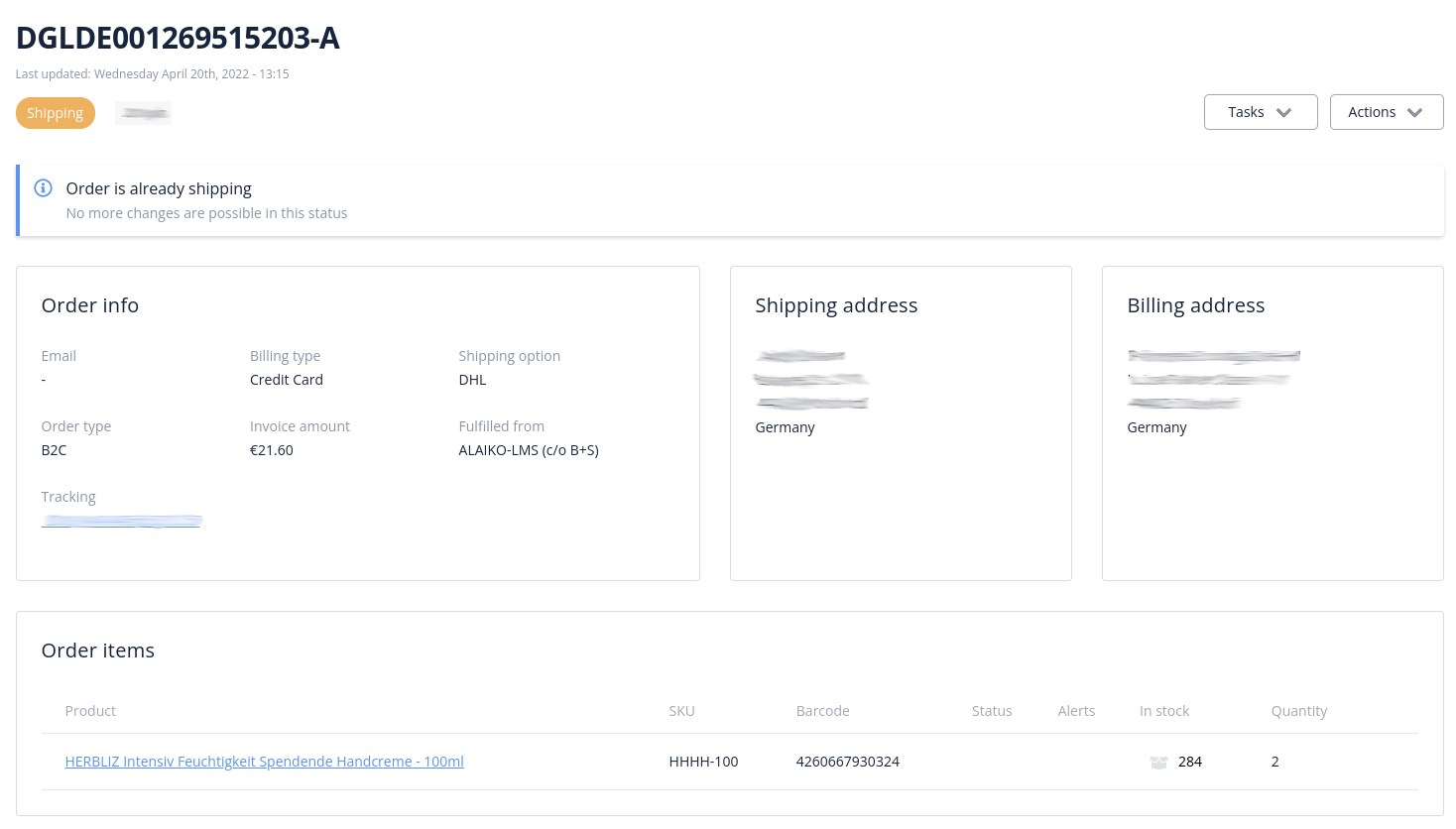
Offline Sales
Before 2021 Herbliz used to sell its products offline via retail outlets. The company used standard 1C:Drive functionality for cash registers to automate the sales process: sellers scanned product barcodes, accepted payments, and printed out sales slips. Such paper slips were given to customers while the system created an electronic copy.
Sales slip screenshot:
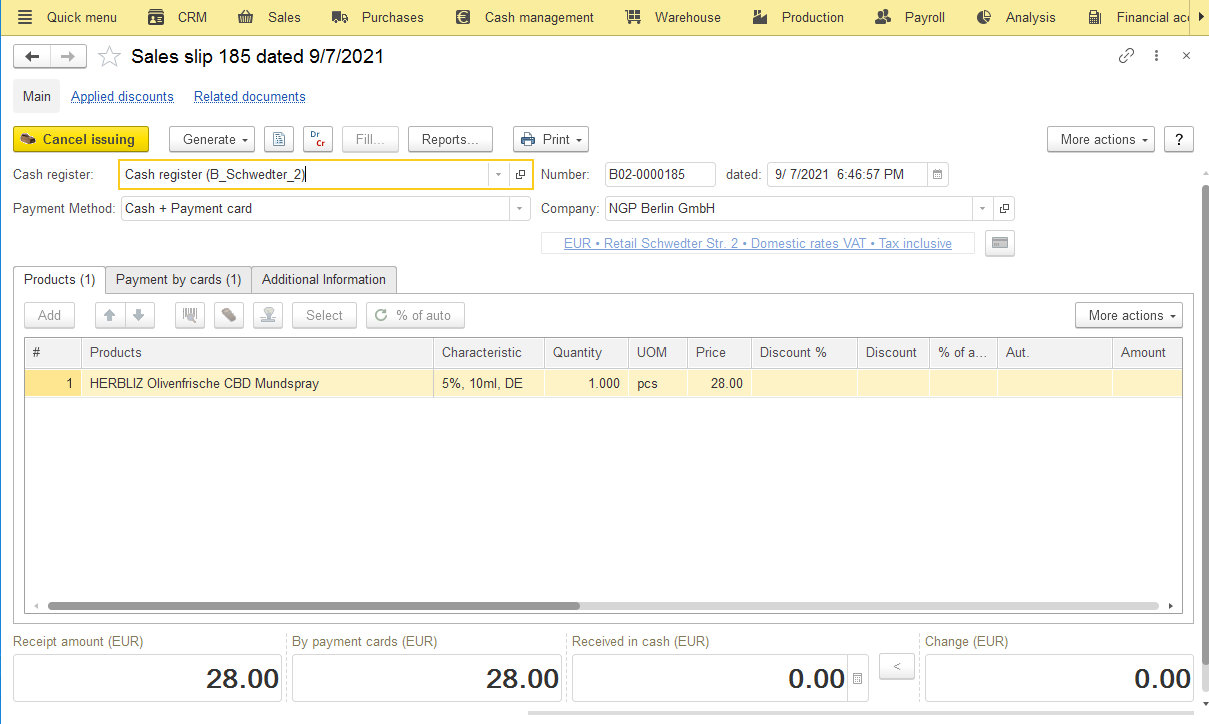
The software generated a Shift Closure Report document at the end of the day. It contained all sales slips registered in the system during the day. The Shift Closure Report helped calculate product costs, monitor inventory, and similar.
Shift Closure Report screenshot:
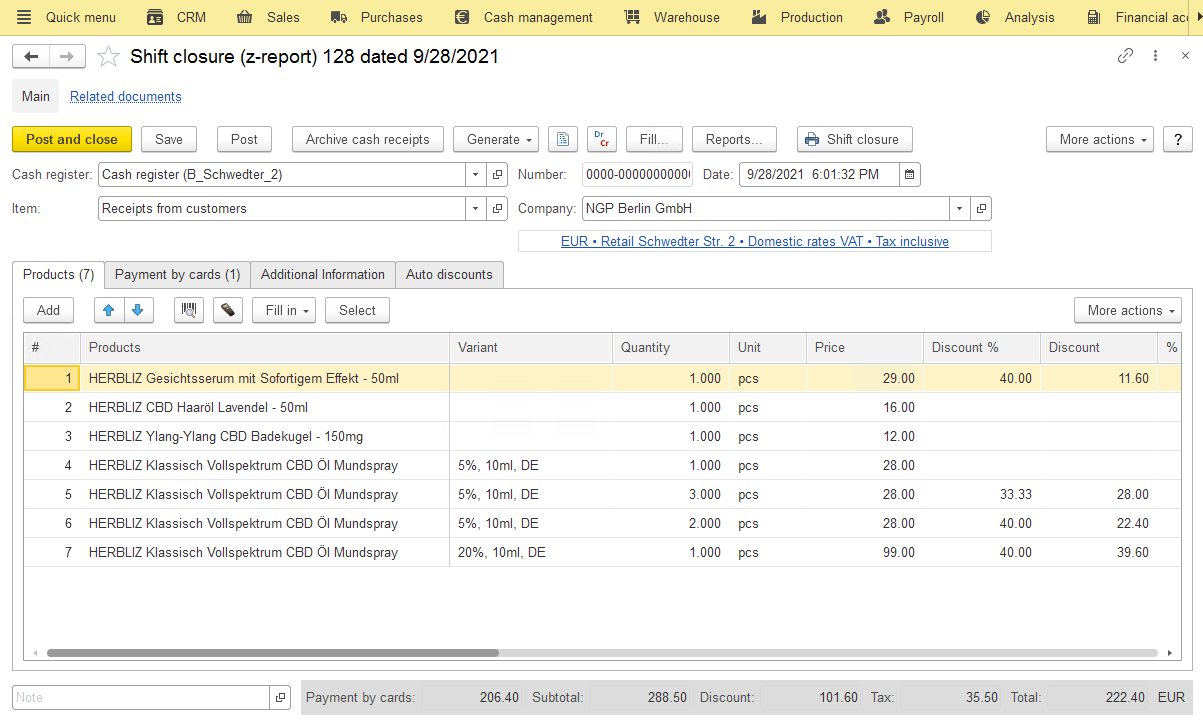
One of the legal requirements in Germany is that offline shops should have a technical security system (TSE) for protection against manipulation. A TSE unit is a small device attached to each cash register. Its role is to monitor every sales slip printed by it. To deploy this system at Herbliz, the developer integrated 1C:Drive cash register software with the TSE, using the HTTP(S) services built into the 1C:Enterprise platform. The development process on the side of the 1C system took about six weeks.
The standard set of 1C:Drive features for managing inventory was enough to manage inventory in each warehouse individually and transfer products between warehouses, which means that no customization for inventory management functionality was required.
Wholesale
In addition to retail sales, Herbliz offers its products to wholesale customers. Such customers require the company to provide invoices that fully meet specific requirements. For example, one of the wholesale customers wanted to have their invoice precisely the way it looks on the screenshot below.
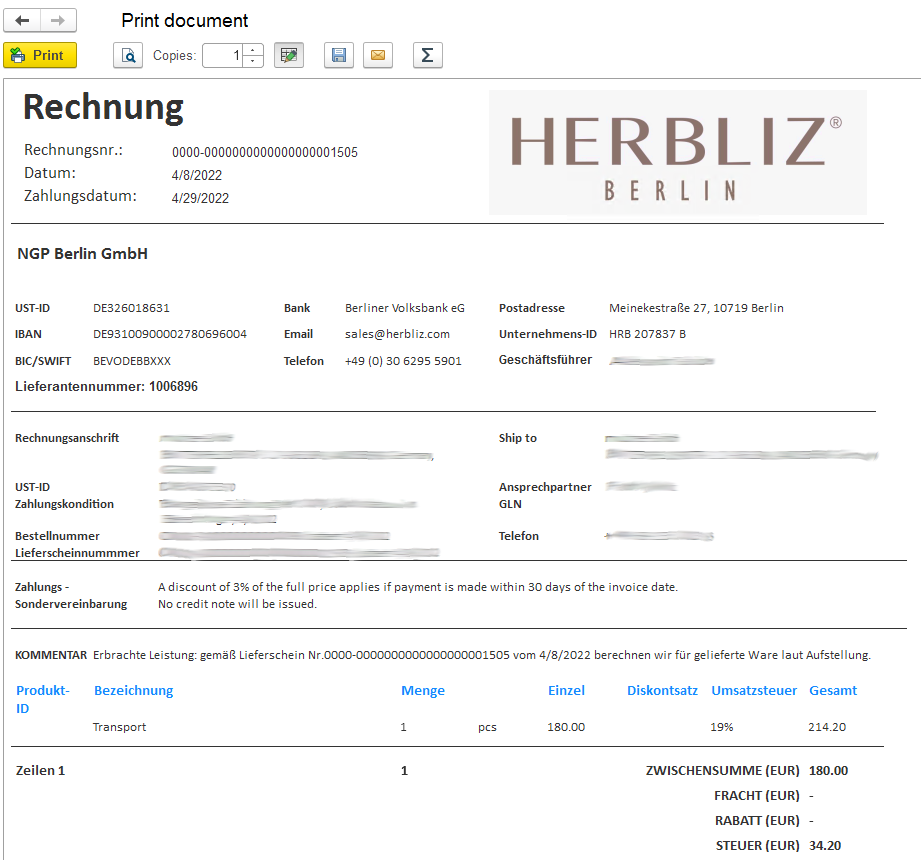
It was a quick and easy task thanks to low-code functionality built into the 1C platform. The platform can boast a powerful print wizard that allows the creation of print forms of any complexity. The screenshot below demonstrates the print wizard with edit mode active.
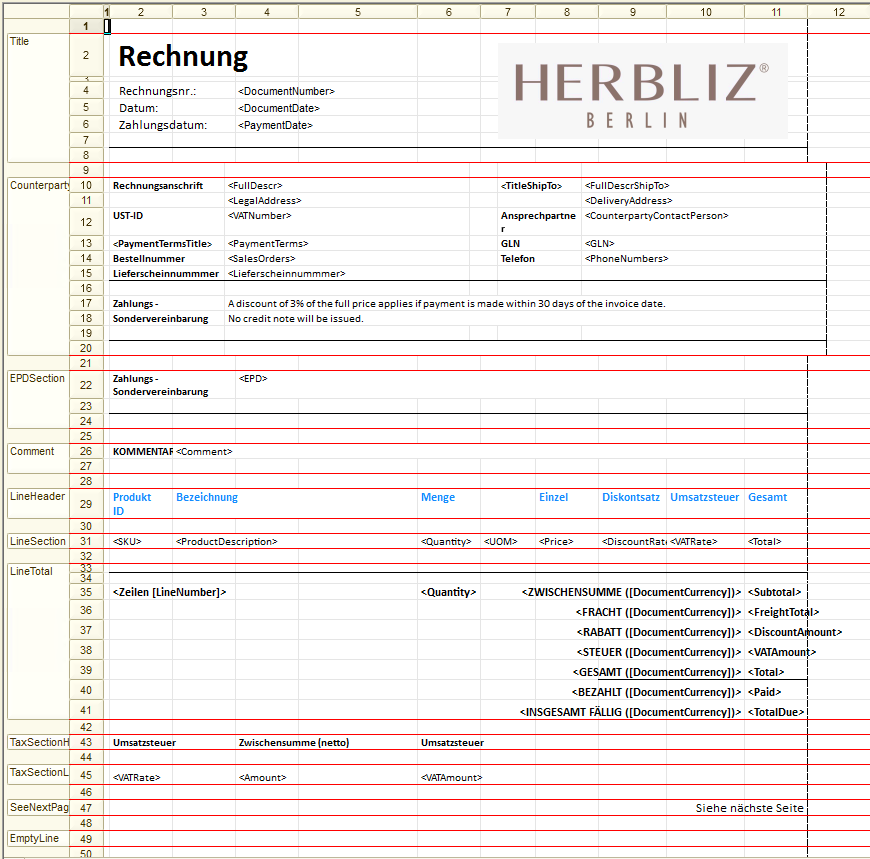
Manufacturing
The manufacturing process at Herbliz comprises the mixing of ingredients and packaging of ready products. In the 1C system, it is a single operation of joining together all components, including oil, flavoring, and packaging. Standard 1C:Drive functionality provides for the company cost accounting that includes procurement and storage of components, as well as handling of finished products. Also, the tools that come with the solution allow the company to calculate product production costs.
Finished products enter the company warehouse and then get dispatched to wholesale customers or the fulfillment agent warehouse. To help employees process goods quicker and with fewer errors, the company intends to create a mobile application based on the 1C:Enterprise platform. It should not be a big issue as developers build cross-platform mobile applications using the same programming language and IDE as in developing the main piece of software, which makes the development really fast.
It is also worth mentioning that the 1C:Enterprise platform allows several methods to create mobile applications rapidly. In the simplest case, users can get their hands on a mobile product after a couple of days of a developer's work. At that, such a product is fully functional and totally meets the business requirements.
The Outcome of the Automation Project
Alexander Biryukov, Herbliz CTO, comments on the automation of business with the 1C:Enterprise platform:
The most important thing for us is the deployment speed. The period between initial installation with adding initial data to catalogs and the actual start of work is pretty short. In our case, the whole process took only 4 days. In a matter of days, the company started generating revenue.
Further on, as the company processes were becoming more complex (more products, more distribution channels, cooperation with external marketplaces and the fulfillment agent), the information system kept growing and changing together with the company. Thanks to high flexibility and the ease of developing on the 1C:Enterprise platform, there are no tasks we cannot do. Still, even if we miss an option that we need, say, detailed data analysis, we can arrange for data exchange between the platform and external systems via multiple integration options the 1C:Enterprise platform is rich in.
Our short-term plan is to add integration with a payment processing system called Klarna. Currently, we use Klarna to handle payments on all orders that come through our website. Thus, the integration with our ERP should speed up order processing and minimize the risk of errors.





